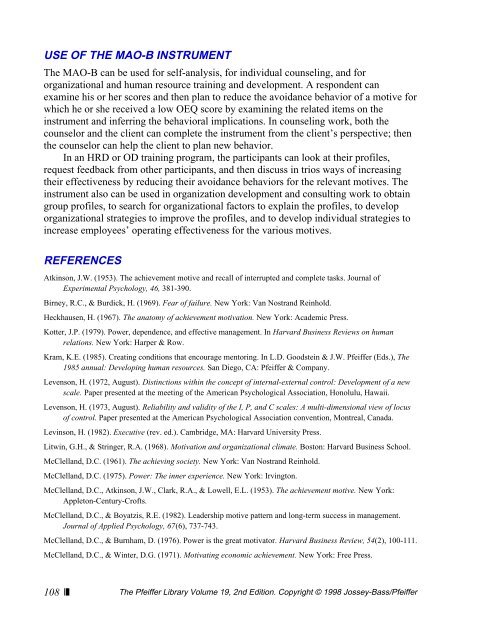motivational analysis of organizations
motivational analysis of organizations
motivational analysis of organizations
You also want an ePaper? Increase the reach of your titles
YUMPU automatically turns print PDFs into web optimized ePapers that Google loves.
USE OF THE MAO-B INSTRUMENT<br />
The MAO-B can be used for self-<strong>analysis</strong>, for individual counseling, and for<br />
organizational and human resource training and development. A respondent can<br />
examine his or her scores and then plan to reduce the avoidance behavior <strong>of</strong> a motive for<br />
which he or she received a low OEQ score by examining the related items on the<br />
instrument and inferring the behavioral implications. In counseling work, both the<br />
counselor and the client can complete the instrument from the client’s perspective; then<br />
the counselor can help the client to plan new behavior.<br />
In an HRD or OD training program, the participants can look at their pr<strong>of</strong>iles,<br />
request feedback from other participants, and then discuss in trios ways <strong>of</strong> increasing<br />
their effectiveness by reducing their avoidance behaviors for the relevant motives. The<br />
instrument also can be used in organization development and consulting work to obtain<br />
group pr<strong>of</strong>iles, to search for organizational factors to explain the pr<strong>of</strong>iles, to develop<br />
organizational strategies to improve the pr<strong>of</strong>iles, and to develop individual strategies to<br />
increase employees’ operating effectiveness for the various motives.<br />
REFERENCES<br />
Atkinson, J.W. (1953). The achievement motive and recall <strong>of</strong> interrupted and complete tasks. Journal <strong>of</strong><br />
Experimental Psychology, 46, 381-390.<br />
Birney, R.C., & Burdick, H. (1969). Fear <strong>of</strong> failure. New York: Van Nostrand Reinhold.<br />
Heckhausen, H. (1967). The anatomy <strong>of</strong> achievement motivation. New York: Academic Press.<br />
Kotter, J.P. (1979). Power, dependence, and effective management. In Harvard Business Reviews on human<br />
relations. New York: Harper & Row.<br />
Kram, K.E. (1985). Creating conditions that encourage mentoring. In L.D. Goodstein & J.W. Pfeiffer (Eds.), The<br />
1985 annual: Developing human resources. San Diego, CA: Pfeiffer & Company.<br />
Levenson, H. (1972, August). Distinctions within the concept <strong>of</strong> internal-external control: Development <strong>of</strong> a new<br />
scale. Paper presented at the meeting <strong>of</strong> the American Psychological Association, Honolulu, Hawaii.<br />
Levenson, H. (1973, August). Reliability and validity <strong>of</strong> the I, P, and C scales: A multi-dimensional view <strong>of</strong> locus<br />
<strong>of</strong> control. Paper presented at the American Psychological Association convention, Montreal, Canada.<br />
Levinson, H. (1982). Executive (rev. ed.). Cambridge, MA: Harvard University Press.<br />
Litwin, G.H., & Stringer, R.A. (1968). Motivation and organizational climate. Boston: Harvard Business School.<br />
McClelland, D.C. (1961). The achieving society. New York: Van Nostrand Reinhold.<br />
McClelland, D.C. (1975). Power: The inner experience. New York: Irvington.<br />
McClelland, D.C., Atkinson, J.W., Clark, R.A., & Lowell, E.L. (1953). The achievement motive. New York:<br />
Appleton-Century-Cr<strong>of</strong>ts.<br />
McClelland, D.C., & Boyatzis, R.E. (1982). Leadership motive pattern and long-term success in management.<br />
Journal <strong>of</strong> Applied Psychology, 67(6), 737-743.<br />
McClelland, D.C., & Burnham, D. (1976). Power is the great motivator. Harvard Business Review, 54(2), 100-111.<br />
McClelland, D.C., & Winter, D.G. (1971). Motivating economic achievement. New York: Free Press.<br />
108 ❘❚<br />
The Pfeiffer Library Volume 19, 2nd Edition. Copyright © 1998 Jossey-Bass/Pfeiffer

















